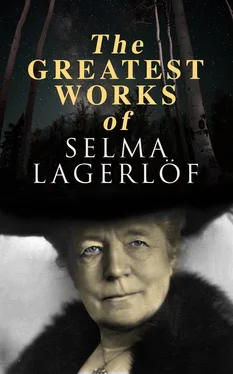The small birds behaved in the most extraordinary manner. Not only did they force the eagle to flee, they pursued him a long distance down the valley, and everywhere the people heard their cries. Women came out and clapped their hands so that it sounded like a volley of musketry, and the men rushed out with rifles.
The same thing was repeated every time the eagle swept toward the ground. The boy abandoned the hope that the eagle could procure any food for him. It had never occurred to him before that Gorgo was so much hated. He almost pitied him.
In a little while they came to a homestead where the housewife had just been baking. She had set a platter of sugared buns in the back yard to cool and was standing beside it, watching, so that the cat and dog should not steal the buns.
The eagle circled down to the yard, but dared not alight right under the eyes of the peasant woman. He flew up and down, irresolute; twice he came down as far as the chimney, then rose again.
The peasant woman noticed the eagle. She raised her head and followed him with her glance.
"How peculiarly he acts!" she remarked. "I believe he wants one of my buns."
She was a beautiful woman, tall and fair, with a cheery, open countenance. Laughing heartily, she took a bun from the platter, and held it above her head.
"If you want it, come and take it!" she challenged.
While the eagle did not understand her language, he knew at once that she was offering him the bun. With lightning speed, he swooped to the bread, snatched it, and flew toward the heights.
When the boy saw the eagle snatch the bread he wept for joy—not because he would escape suffering hunger for a few days, but because he was touched by the peasant woman's sharing her bread with a savage bird of prey.
Where he now sat on the pine branch he could recall at will the tall, fair woman as she stood in the yard and held up the bread.
She must have known that the large bird was a golden eagle—a plunderer, who was usually welcomed with loud shots; doubtless she had also seen the queer changeling he bore on his back. But she had not thought of what they were. As soon as she understood that they were hungry, she shared her good bread with them.
"If I ever become human again," thought the boy, "I shall look up the pretty woman who lives near the great river, and thank her for her kindness to us."
Table of Contents
While the boy was still at his breakfast he smelled a faint odour of smoke coming from the north. He turned and saw a tiny spiral, white as a mist, rise from a forest ridge—not from the one nearest him, but from the one beyond it. It looked strange to see smoke in the wild forest, but it might be that a mountain stock farm lay over yonder, and the women were boiling their morning coffee.
It was remarkable the way that smoke increased and spread! It could not come from a ranch, but perhaps there were charcoal kilns in the forest.
The smoke increased every moment. Now it curled over the whole mountain top. It was not possible that so much smoke could come from a charcoal kiln. There must be a conflagration of some sort, for many birds flew over to the nearest ridge. Hawks, grouse, and other birds, who were so small that it was impossible to recognize them at such a distance, fled from the fire.
The tiny white spiral of smoke grew to a thick white cloud which rolled over the edge of the ridge and sank toward the valley. Sparks and flakes of soot shot up from the clouds, and here and there one could see a red flame in the smoke. A big fire was raging over there, but what was burning? Surely there was no large farm hidden in the forest.
The source of such a fire must be more than a farm. Now the smoke came not only from the ridge, but from the valley below it, which the boy could not see, because the next ridge obstructed his view. Great clouds of smoke ascended; the forest itself was burning!
It was difficult for him to grasp the idea that the fresh, green pines could burn. If it really were the forest that was burning, perhaps the fire might spread all the way over to him. It seemed improbable; but he wished the eagle would soon return. It would be best to be away from this. The mere smell of the smoke which he drew in with every breath was a torture.
All at once he heard a terrible crackling and sputtering. It came from the ridge nearest him. There, on the highest point, stood a tall pine like the one in which he sat. A moment before it had been a gorgeous red in the morning light. Now all the needles flashed, and the pine caught fire. Never before had it looked so beautiful! But this was the last time it could exhibit any beauty, for the pine was the first tree on the ridge to burn. It was impossible to tell how the flames had reached it. Had the fire flown on red wings, or crawled along the ground like a snake? It was not easy to say, but there it was at all events. The great pine burned like a birch stem.
Ah, look! Now smoke curled up in many places on the ridge. The forest fire was both bird and snake. It could fly in the air over wide stretches, or steal along the ground. The whole ridge was ablaze!
There was a hasty flight of birds that circled up through the smoke like big flakes of soot. They flew across the valley and came to the ridge where the boy sat. A horned owl perched beside him, and on a branch just above him a hen hawk alighted. These would have been dangerous neighbours at any other time, but now they did not even glance in his direction—only stared at the fire. Probably they could not make out what was wrong with the forest. A marten ran up the pine to the tip of a branch, and looked at the burning heights. Close beside the marten sat a squirrel, but they did not appear to notice each other.
Now the fire came rushing down the slope, hissing and roaring like a tornado. Through the smoke one could see the flames dart from tree to tree. Before a branch caught fire it was first enveloped in a thin veil of smoke, then all the needles grew red at one time, and it began to crackle and blaze.
In the glen below ran a little brook, bordered by elms and small birches. It appeared as if the flames would halt there. Leafy trees are not so ready to take fire as fir trees. The fire did pause as if before a gate that could stop it. It glowed and crackled and tried to leap across the brook to the pine woods on the other side, but could not reach them.
For a short time the fire was thus restrained, then it shot a long flame over to the large, dry pine that stood on the slope, and this was soon ablaze. The fire had crossed the brook! The heat was so intense that every tree on the mountain was ready to burn. With the roar and rush of the maddest storm and the wildest torrent the forest fire flew over to the ridge.
Then the hawk and the owl rose and the marten dashed down the tree. In a few seconds more the fire would reach the top of the pine, and the boy, too, would have to be moving. It was not easy to slide down the long, straight pine trunk. He took as firm a hold of it as he could, and slid in long stretches between the knotty branches; finally he tumbled headlong to the ground. He had no time to find out if he was hurt—only to hurry away. The fire raced down the pine like a raging tempest; the ground under his feet was hot and smouldering. On either side of him ran a lynx and an adder, and right beside the snake fluttered a mother grouse who was hurrying along with her little downy chicks.
When the refugees descended the mountain to the glen they met people fighting the fire. They had been there for some time, but the boy had been gazing so intently in the direction of the fire that he had not noticed them before.
In this glen there was a brook, bordered by a row of leaf trees, and back of these trees the people worked. They felled the fir trees nearest the elms, dipped water from the brook and poured it over the ground, washing away heather and myrtle to prevent the fire from stealing up to the birch brush.
Читать дальше












